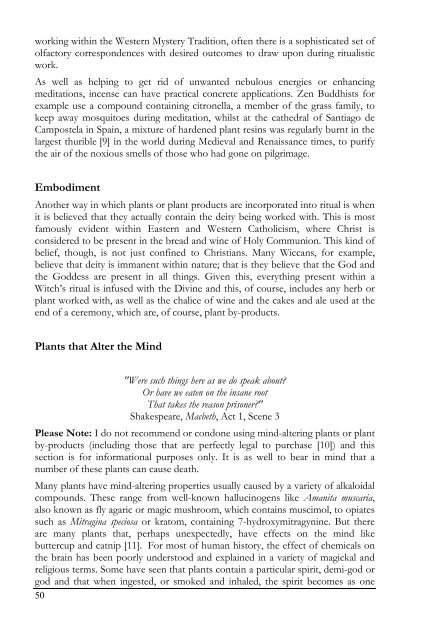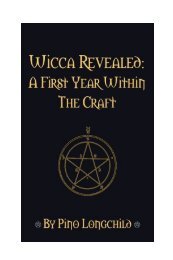A Magickal Herball Compleat.pdf - Magicka School
A Magickal Herball Compleat.pdf - Magicka School
A Magickal Herball Compleat.pdf - Magicka School
Create successful ePaper yourself
Turn your PDF publications into a flip-book with our unique Google optimized e-Paper software.
working within the Western Mystery Tradition, often there is a sophisticated set of<br />
olfactory correspondences with desired outcomes to draw upon during ritualistic<br />
work.<br />
As well as helping to get rid of unwanted nebulous energies or enhancing<br />
meditations, incense can have practical concrete applications. Zen Buddhists for<br />
example use a compound containing citronella, a member of the grass family, to<br />
keep away mosquitoes during meditation, whilst at the cathedral of Santiago de<br />
Campostela in Spain, a mixture of hardened plant resins was regularly burnt in the<br />
largest thurible [9] in the world during Medieval and Renaissance times, to purify<br />
the air of the noxious smells of those who had gone on pilgrimage.<br />
Embodiment<br />
Another way in which plants or plant products are incorporated into ritual is when<br />
it is believed that they actually contain the deity being worked with. This is most<br />
famously evident within Eastern and Western Catholicism, where Christ is<br />
considered to be present in the bread and wine of Holy Communion. This kind of<br />
belief, though, is not just confined to Christians. Many Wiccans, for example,<br />
believe that deity is immanent within nature; that is they believe that the God and<br />
the Goddess are present in all things. Given this, everything present within a<br />
Witch’s ritual is infused with the Divine and this, of course, includes any herb or<br />
plant worked with, as well as the chalice of wine and the cakes and ale used at the<br />
end of a ceremony, which are, of course, plant by-products.<br />
Plants that Alter the Mind<br />
"Were such things here as we do speak about?<br />
Or have we eaten on the insane root<br />
That takes the reason prisoner?"<br />
Shakespeare, Macbeth, Act 1, Scene 3<br />
Please Note: I do not recommend or condone using mind-altering plants or plant<br />
by-products (including those that are perfectly legal to purchase [10]) and this<br />
section is for informational purposes only. It is as well to bear in mind that a<br />
number of these plants can cause death.<br />
Many plants have mind-altering properties usually caused by a variety of alkaloidal<br />
compounds. These range from well-known hallucinogens like Amanita muscaria,<br />
also known as fly agaric or magic mushroom, which contains muscimol, to opiates<br />
such as Mitragina speciosa or kratom, containing 7-hydroxymitragynine. But there<br />
are many plants that, perhaps unexpectedly, have effects on the mind like<br />
buttercup and catnip [11]. For most of human history, the effect of chemicals on<br />
the brain has been poorly understood and explained in a variety of magickal and<br />
religious terms. Some have seen that plants contain a particular spirit, demi-god or<br />
god and that when ingested, or smoked and inhaled, the spirit becomes as one<br />
50




